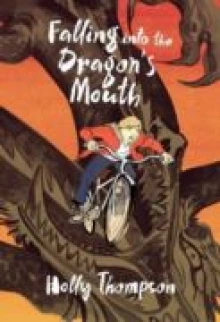
Falling Into the Dragon's Mouth
Written by Holly Thompson
Holt, 2016, 352 pp.
ISBN 9781627791342.
This novel told in verse tells the story of Jason Parker, a sixth grader, who is an American teen living in Japan because his parents are employed there. He has a younger sister Cora whom he often babysits and with whom he takes secret adventures. He finds it difficult to go to a Japanese school and make friends. In fact, it is way more than just difficult. It is absolutely miserable as his Japanese classmates verbally and physically abuse him. For Jason, the school is literally like entering into a dragon’s mouth with sharp teeth and blasting fire. Jason wants to transfer to an international school with the hope that he will meet students more like him and avoid the Japanese bullies, but transferring to the international school costs money and time. Told in vivid detail, readers may be shocked to discover how much Jason suffers and the seriousness of school bullying.
Readers who have background knowledge of Japanese culture will find Thompson’s descriptions of Japanese culture accurate. She uses Japanese words appropriately in context, which reveals how well she has interwoven Japanese culture and words into the story. Thompson is an American who has lived in Japan for nearly 20 years and so is not an outsider to Japanese culture. For those who are not familiar with Japanese culture and words, the glossary and the cultural guide at the end of the book explains not only the meaning of the words, but also Japanese cultural practices.
Holly Thompson has written verse novels such as Orchards (2012) and The Language Inside (2013) revealing the strong inner voice she employs with many of her protagonists. Falling into the Dragon’s Mouth reveals Jason’s strong inner voice which allows readers to feel Jason’s pain. Their hearts will go out to him. Other verse novels like Rhyme Schemer (K. A. Holt, 2014) and Addie on the Inside (James Howe, 2012) can be paired with Falling into the Dragon’s Mouth. These verse novels also deal with protagonists struggling at school. It would be especially interesting to compare and discuss bullying within Rhyme Schemer (2014) as this book narrates the bullying issue from a different perspective. All three verse novels will lead teens to a discussion of bullying, fitting in, and finding their identities.
In addition to introducing readers to a world of verse and the beauty of the language, Thompson’s books show readers struggles of bicultural teens--especially between Japanese and American cultures. Thompson’s books also pose questions about serious issues that teens confront regardless of their cultural identities, including bullying, suicide, and fitting in with peers. Not all of Thompson’s books deal with heavy topics, however. She has a picture book for children, The Wakame Gatherers (2007) that presents the benefits of being a bicultural child.
There is no doubt that Thompson’s authentic descriptions of bicultural characters come from her personal experiences. She has developed a bicultural identity as an American and who is a long-term resident in Japan, and her experiences are well reflected in her books. Thompson’s believable characters help readers to experience the struggles of living within and between two different cultures. Visit hatbooks.com for more information on Holly Thompson and her books. An interview at Doshisha International High school, Kyoto, Japan is also available on her website.
Jongsun Wee, Winona State University, Winona, MN
WOW Review, Volume VIII, Issue 3 by Worlds of Words is licensed under a Creative Commons Attribution-NonCommercial-ShareAlike 4.0 International License. Based on work at https://wowlit.org/on-line-publications/review/volumeviii1-3.










